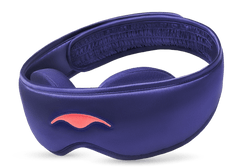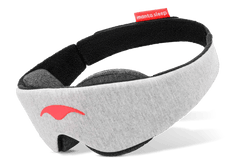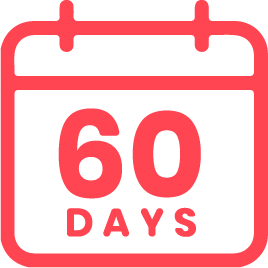6 Tips for Better Sleep During the Holidays
The holiday season is just around the corner.
That means…
There'll be parties for hosting
Marshmallows for toasting
And caroling out in the snow
Ever notice that precisely zero lines of that song mention sleep?
It makes sense, honestly – it’s incredibly easy to get so swept up in the excitement of the holidays that sleep falls by the wayside.
But skimping on sleep will do you more harm than good. Lack of sleep will drain your energy and affect your ability to be present, right when energy and presence are the most important. (You need both to make the most of your time with fam and friends!)
Here are 6 tips to make sure you’re getting good-quality rest this holiday season:
Tip #1 — Prepare for the Festive Season Early
As much as everyone loves the holiday season, it’s one of the most stressful periods of the year. There’s just so much to do and very little time.
Your to-do list probably includes shopping for gifts, mailing cards, preparing a feast and cleaning your house — and that’s just the first page of your list.
Despite the huge number of things to do, it’s common to procrastinate and leave everything until the last minute. The inevitable result? Sleep deprivation.
Don’t let this happen to you. Schedule out your to-dos in advance. That way, you’ll get things done steadily over time, instead of letting everything pile up.
Also, don’t be afraid to ask for help if you feel overwhelmed.
Tip #2 — Stick to Your Usual Sleep Schedule
With your friends and family over, it may be difficult for you to stick to your regular sleep schedule. After all, there’s a lot for you to catch up on.
However, staying up past your usual bedtime can lead to sleep deprivation. And that can really put a damper on your holiday celebrations.
So, if you really must stay up late, do so for no more than an hour over your regular schedule.
This may be harder if you’re traveling across time zones, as everyone is either going to bed earlier or later than you. However, you need to make a genuine effort to adhere to your usual schedule to prevent disturbing your sleep patterns.
Tip #3 — Avoid Snacking Excessively at Night
Despite having seconds (or even thirds) at dinner, you may find yourself raiding the fridge in search of leftovers to snack on. And you’ll usually find a bunch of them — from juicy turkey to creamy mashed potatoes and scrumptious pies.
However, you need to say no to too much food if you want to sleep soundly. If you stuff yourself before bedtime, your body will be too focused on digesting your food to repair itself.
If you get a case of the munchies around bedtime, opt for complex carbs, milk, cheese or sweet potatoes. These promote sleep while allowing your body to relax.
Tip #4 — Drink in Moderation Before Bed
Holiday parties can get wild, especially if eggnog and peppermint-flavored hard beverages are involved. However, you need to drink moderately to avoid affecting your sleep schedule.
While alcohol may make you feel sleepy, it negatively affects the quality of your sleep. It also affects the sleep of those around you, because when you drink, you’re more likely to snore. And if you have a sleep disorder (like obstructive sleep apnea), drinking can make it worse.
So, if you feel like drinking, enjoy a glass or two. But make sure to cut yourself off 2-3 hours before you go to bed.
Tip #5 — Take Care of Yourself
Lots of people enjoy this time of year — but there are also plenty of people who dread it.
Family gatherings can dredge up old arguments and unresolved issues. The stress of those interactions can chase your sleep away, even before they actually take place.
The key to avoiding stress (and the sleep deprivation associated with it) is to plan ahead for what you will and won’t engage in. Make plans to avoid the people and/or conversations that trigger you, and set boundaries whenever you need to, to make sure drama doesn’t disrupt your sleep.
Put yourself and your well-being first. Otherwise, you’ll be too stressed to enjoy the holidays by day, and relax to the fullest at night.
Tip #6 — Plan More Outdoor Activities
The holiday season is the perfect opportunity for you to enjoy outdoor activities with those you love.
In addition to helping you get ample exercise, doing outdoor activities during the day will reset and strengthen your circadian rhythm.
That’s because your circadian rhythm reacts to daylight and darkness to regulate your internal clock. By spending more time in the light during the day, you’ll get to sleep faster and sleep more deeply all night.
Here’s to a Happy Holiday Season — and a Good Night’s Sleep
It’s easy to get swept away in the hustle and bustle of the holidays. However, you need to prevent your holiday cheer from depriving you of sleep.
It can be hard to put yourself first when family and friends are around, but it’s imperative that you prioritize taking care of yourself. And good-quality sleep is #1 on the list of things that safeguard your health and well-being.
Got any tips that help you cope during the holidays? Share them in the comments below.
Sources:
(1) “7 Ways to Get Better Sleep During the Holidays." Health Essentials, 28 Nov. 2014, www.health.clevelandclinic.org/7-ways-to-get-better-sleep-during-the-holidays/
(2) “How to Beat Holiday Sleep Challenges." Sleep.org, www.sleep.org/articles/beat-holiday-sleep-challenges/. Accessed 5 Dec. 2019.
(3) De Lorenzo, Carolyn. “9 Ways The Holidays Can Affect Your Sleep — And What To Do About It.” Bustle, 30 Nov. 2018, www.bustle.com/p/9-ways-the-holidays-can-affect-your-sleep-what-to-do-about-it-13178997
(4) Phillips, Kevin. "9 Holiday Sleep Tips to Keep You from Turning Into a Grinch." Alaska Sleep Clinic, 25 Nov. 2014, www.alaskasleep.com/blog/sleep-tips-for-the-holidays
Don't let holiday stress steal your sleep.
We have 6 tips to help you get good sleep this holiday season. 🎄😴
#sleep #sleepingtips #mantasleep
Disclaimer: The information contained in this website or provided through our blog, e-mails, or programs is for informational purposes only. It is not intended to be a substitute for medical advice, diagnosis or treatment that can be provided by your healthcare professionals.





































